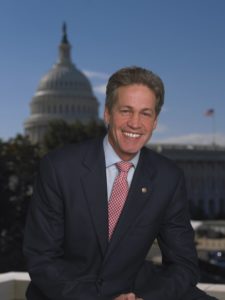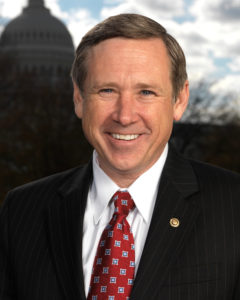iF: How did you first become interested in U.S. efforts to respond to the threat of Iran?
 NC: As the Ranking Member of the Senate Foreign Relations Subcommittee on Near East, South and Central Asian Affairs, I take a particular interest in the Middle East. I have great concerns regarding the threat Iran poses to America. Iran has long sponsored terrorism that has killed American citizens, and now undermines our efforts in Iraq by fueling the violence there. If Iran acquires a nuclear weapon, the security landscape of the Middle East will change and the security balance of the world will become unstable.
NC: As the Ranking Member of the Senate Foreign Relations Subcommittee on Near East, South and Central Asian Affairs, I take a particular interest in the Middle East. I have great concerns regarding the threat Iran poses to America. Iran has long sponsored terrorism that has killed American citizens, and now undermines our efforts in Iraq by fueling the violence there. If Iran acquires a nuclear weapon, the security landscape of the Middle East will change and the security balance of the world will become unstable.
As a member of the Jewish community and strong supporter of Israel, I am concerned about the existential threat Iran poses to Israel. Israel has faced challenges to its existence ever since it was formed, but the danger has never been so great. Iran is intent upon destroying Israel, and it is rapidly acquiring the means to do so.
 MK: As a drilling Naval Reserve Intelligence Officer, my perspective of the world is unique for a member of Congress. When we look across the Middle East, we see many threats to our democratic allies in Israel. A Hamas terrorist government building up advanced weapons the in Gaza Strip. The Hizbullah terrorist organization is rearming and preparing for a third Lebanon War. These threats are difficult and painful, but they are threats that Israel can largely handle; they do not pose a mortal danger to the Jewish state. But one rising threat – the existential threat – has the potential to destroy this little democracy and end more than 100 years of Zionism in an instant. And that is the growing danger we see in Iran, where a dictator openly calls for a fellow member of the United Nations to be wiped off the map. The Iranian nuclear and ballistic missile programs pose a mortal danger to the State of Israel, a danger we must remove through diplomatic means as soon as possible.
MK: As a drilling Naval Reserve Intelligence Officer, my perspective of the world is unique for a member of Congress. When we look across the Middle East, we see many threats to our democratic allies in Israel. A Hamas terrorist government building up advanced weapons the in Gaza Strip. The Hizbullah terrorist organization is rearming and preparing for a third Lebanon War. These threats are difficult and painful, but they are threats that Israel can largely handle; they do not pose a mortal danger to the Jewish state. But one rising threat – the existential threat – has the potential to destroy this little democracy and end more than 100 years of Zionism in an instant. And that is the growing danger we see in Iran, where a dictator openly calls for a fellow member of the United Nations to be wiped off the map. The Iranian nuclear and ballistic missile programs pose a mortal danger to the State of Israel, a danger we must remove through diplomatic means as soon as possible.
iF: Please describe your direct involvement in congressional efforts to deter Iran from attaining nuclear weapons, or from supporting international terrorism.
MK: Three years ago I founded the bipartisan Iran Working Group with my good friend, Representative Rob Andrews (D-NJ), to educate members of Congress and staff to the growing danger in Iran. We studied this issue more than any other members and in our research we came across a stunning weakness. Despite its status as a leading OPEC nation, the mullahs have so mishandled the nation’s energy sector that Iran lacks the refining capacity to turn its oil into gasoline. Iran is dependent for almost half its gasoline on foreign imports – most delivered by one Dutch company, Vitol, aboard tankers mostly insured by one British firm, Lloyds of London. Looking at history, we find an interesting diplomatic lever effectively used by President Kennedy during the Cuban Missile Crisis. We can see how a naval quarantine of gasoline would grind Iran’s economy to a halt, leaving thousands of pro-Western Iranian young people to wonder why its leaders would choose nuclear weapons over their economic welfare. And because Iran’s naval strength is limited, a quarantine administered 200 miles off the coast would leave Iran with no military response. A quarantine of gasoline would pit our strength against their weakness, achieving our objectives without a shot being fired.
NC: During my tenure in the Senate I have worked to develop and cosponsor legislation that deals with Iran through sanctions and other measures. Last September, Congress passed the Iran Freedom and Support Act. IFSA expanded sanctions that deter investment in Iran, specifically in its energy sector. It also aids civil society groups in Iran that are working to push Iran towards democracy.
I also helped develop a bill introduced in March called the Iran Counter-Proliferation Act of 2007. This bill expands sanctions against Iran and pressures countries that assist the Iranian nuclear program. Countries such as Russia and China have economic interests in Iran and have therefore have impeded broader international sanctions at the UN.
In my position as Ranking Member of the Senate Foreign Relations Subcommittee on Near East Affairs, I regularly meet with Middle East leaders who also fear a nuclear Iran. For example, the Egyptians feel they face as great of a threat as Israel. As a member of the Foreign Relations Committee, I also maintain dialogue with the Europeans, who have been cooperative. To succeed, we need to mobilize the entire international community.
iF: Please evaluate the performance of Congress and the Executive in curbing the Iranian threat.
NC: Congress has acted decisively by passing the legislation to sanction Iran and support movements that seek regime change. Our message is that, through external and internal pressure, there will be great costs to pursuing a nuclear path.
The executive branch has worked tirelessly to isolate Iran through diplomatic means. I am frustrated that we have not yet imposed stronger multilateral sanctions through the U.N. This situation stems mainly from the economic interests of some of our international partners. Iran wields considerable influence because of its oil resources. Still, we must tell our partners that we expect them to act responsibly.
I think our sanctions have had an impact. Many companies considering business deals with Iran have reconsidered. Companies such as British Petroleum (BP) have withdrawn major deals. We also squeezed Iran’s access to capital. The Treasury Department barred U.S. bank transactions with Iran’s state-owned Bank Sepah because of its involvement in Iran’s illicit missile activities, curtailing Iran’s access to the international financial system.
There are good signs inside Iran, too. The prices of basic foods such as beef, poultry, fruits and bread have increased by 25 percent and housing costs have risen 30 percent in recent months, resulting in rising public discontent and anti-government protests. Recently, Iran’s Supreme Leader Ayatollah Ali Khamenei has allowed criticism of Ahmadinejad’s nuclear and economic policies in reformist newspapers, and even the state-run media.
Iran’s energy sector is highly vulnerable to sanctions, especially when you consider that half of the Iran’s revenue comes from oil exports. Iran also imports 40 percent of its refined petroleum and spends between $20 and $30 billion a year on subsidies to keep the price of gasoline, some foodstuffs, and heating artificially low to quell domestic unrest.
A Johns Hopkins University study last December estimated that Iran’s oil exports will decline to zero by 2015 if it does not invest $100 billion in its energy sector. Tougher U.S. laws and U.N. sanctions could block these investments. The energy sector is Iran’s most important source of leverage. I believe we must undermine this source of leverage.
MK: The Iran Working Group recently hosted Undersecretary of the U.S. Treasury Stuart Levey on Capitol Hill to discuss his work in cutting off Iran’s terror financing. I applaud Levey for his work – one of the biggest success stories nobody knows about.
iF: Senator Coleman, based on your travels to Iraq, what impact does the proposal for an Iraq withdrawal in 2008 have on the current Iranian display of brinksmanship?
NC: I traveled to Iraq last December and again in April, and I concluded that the Iranians are directly involved in the violence there. In April, one General hosted a “show and tell” on Iranian weaponry that our troops captured. Many weapons had “made in Iran” written on them. Many of the Improvised Explosive Devices (IEDs) in Iraq, the greatest cause of death among our troops, are supplied by Iran. Iraq’s National Security Advisor, Dr. Mowaffik al-Rubaie, summed it up when he told me, “Iranian influence is negative and everywhere” in Iraq.
I have been continuously opposed to a precipitous and arbitrary withdrawal from Iraq, an option pushed by my colleagues on the other side of the aisle. There has been great frustration with the Iraqi government’s performance. Our troops are sacrificing their lives for freedom in Iraq. I want to ensure that the Iraqis honor this sacrifice by doing their part before I commit our soldiers long-term. If we continue to see a lack of resolve on the part of the Iraqis, we may need to rethink the mission. But I remain firmly against an arbitrary withdrawal that leaves Iraq in chaos. That would represent a victory for Iran, and a major blow to U.S. credibility.
iF: How could the Middle East landscape change if Iran were to succeed in obtaining nuclear capabilities?
MK: We have already seen Iran pass sophisticated guided missiles to terrorist organizations like Hizbullah. A nuclear Iran would endanger the world, increasing the probability of a nuclear terror attack. Additionally, a nuclear Iran would trigger a nuclear arms race throughout the Middle East – endangering the U.S., Europe, Turkey, and Israel.
NC: The Middle East landscape would become very unstable if Iran acquires a nuclear weapon. Iran has ambitions for regional hegemony, and its Sunni Arab neighbors are afraid of this. Countries such as Saudi Arabia and Egypt may now decide that they need nuclear weapons to counterbalance the Iranians. The proliferation of nuclear weapons would exponentially destabilize a region that is already highly volatile.
A nuclear Iran presents other threats. A nuclear Iran could seek to dominate the Persian Gulf by attempting to control the commerce that is shipped through there. Also, with its history of meddling in neighboring countries such as Iraq and Lebanon, it would be virtually impossible to exert diplomatic leverage on a nuclear Iran. The same rationale applies to Iran’s sponsorship of terrorism, which would likely only increase. Finally, a nuclear Iran would represent an intersection of two of our greatest security threats: terrorism and nuclear weapons. Iran-sponsored terrorists could obtain the technology and materials they need to engage in nuclear terrorism.
The bottom line is that a nuclear Iran is a scenario that we must avoid. If Iran succeeds, we will have to reevaluate our entire political and security policy in the region.
iF: Thank you, gentlemen.

